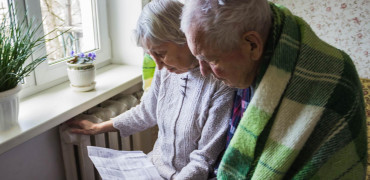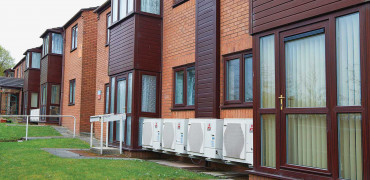None of us can easily avoid the impact of rising energy prices, but the Chancellor’s Spring Statement left millions of the poorest households in the country badly exposed to the triple whammy of the highest inflation rate in 30 years, rapidly accelerating electricity and gas costs, as well as real term cuts in their already low incomes.
The Chancellor provided some help by removing the 5 per cent VAT levy on a range of energy saving products which makes them more affordable, but this will mainly benefit homeowners who already have the resources to invest in top quality insulation schemes and the latest generation of heat pumps and solar panels.
Many of these are of course the same people who live in the best quality homes and are already due to benefit from the boiler upgrade scheme.
Thus, the Chancellor is guilty of directing his efforts at ‘picking the low hanging fruit’ rather than tackling the more difficult, out of reach varieties.
Tenants on below average incomes living in the private rented sector must be left wondering what they have done to deserve being cut adrift again and forced to make difficult choices on what they spend their limited means on.
Do they eat or heat? The advent of longer days and warmer weather will only provide limited relief from the 54 per cent increase in the energy price cap.
Remember we are already derided for having the coldest and draughtiest homes in Europe!
Schemes tailored to each sector
As expected, many charities and campaign groups have called out the Chancellor for his callous attitude towards the poor.
But they have been joined by bodies such as the National Residential Landlords Association in demanding urgent clarification of what is expected from the private rented sector, in terms of how it can contribute carbon emission reductions towards the Government’s net zero target.
While properties in the private rented sector vary enormously in their size, location, condition and cost, with facilities and rents to suit all tastes and pockets – one phrase from the English Housing Survey always stands out for me whenever I read it:
“Private rented dwellings are, on average, older and therefore more likely to have defects to the damp proof course, roof covering, gutters, or down pipes, which could lead to problems with rising or penetrating damp affecting at least one room in the property.”
It backs this statement up with all sorts of facts and figures, but essentially the message is that the private rented sector contains many of the properties where more help should be directed or focussed on, when it comes to improving the energy efficiency of our housing stock and how we heat them.
Remember we are already derided for having the coldest and draughtiest homes in Europe!
Almost a quarter of private rentals (23 per cent) pre-date 1919, so they were built more than 100 years ago when regulations and standards were very different to today.
A significant problem
In 2020-21, the private rented sector accounted for 4.4 million or 19 per cent of the 24 million households in England, although the percentage rises to an overall high of 27 per cent in London where renting is more prevalent.
Of these, roughly 1.1 million private rentals (or 21 per cent) failed to meet the decent homes standard, higher than the proportion of social rented (13 per cent) and owner occupied (16 per cent) homes.
Private rented tenants it turns out are also spending a much higher percentage of their income on their housing costs (37 per cent) and they stay for much shorter periods of time in current homes (4.2 years).
So even if they were able and allowed by their landlords to invest money in their homes, they are dis-incentivised from doing so.
What we badly need is a range of schemes to encourage landlords (and their tenants) to help improve the insulation of their properties and to modernise the heating systems, so they are making more efficient use of renewable energy and are actively contributing to net zero carbon emissions.
Imaginative solutions required
These schemes can make use of tax breaks, grants and interest free loans to pay for the types of property upgrades that Rishi Sunak is currently encouraging homeowners to participate in.
If rental properties are subsequently sold then the Treasury’s investment can always be protected by requiring some degree of repayment based on a sliding scale, according to the number of years since the improvement was made.
Alternatively private landlords could be encouraged to sign up to participate in heat network schemes, where groups of properties are connected to heating systems supplying tens, hundreds or even thousands of properties in a locality.
This could work particularly well for the private rented sector, which often operates in defined areas or clusters within our towns and cities.
Another characteristic of the private rented sector is that it has a much higher proportion of house conversions, where a single house has been sub-divided into flats.
Conversions account for 14 per cent of PRS stock compared with 2 per cent of social rented flats and 2 per cent of owner occupied stock.
Larger heat pump units can be installed for supplying energy to between three and five flats in a single building nowadays, at a much lower average cost than individual units. A single, larger heat pump will take up less space than a number of individual fittings.
Combatting the net zero deniers
As the Prime Minister is fighting off a challenge from a growing number of his backbenchers who do not like the Government’s commitment to achieving net zero by 2050, it means the country needs to look for ways it can maximise its use of the energy we produce ourselves or can access from overseas.
While new wind farms and solar panel installations are infinitely more popular (and quicker to supply green energy) than new nuclear power stations, we should be looking to maximise our efficient use of green energy in order to reduce some of the pressure on the means of production.
Requiring all new buildings to have solar panels will not, on its own, solve our energy generating problems. In fact we probably need legal requirements and enforcement using examples such as introducing seat belts and unleaded petrol in our cars.
But if we are to embark on a nationwide push to insulate every home to modern standards and to install heat pumps in place of gas boilers, then we need to ensure that the strategies and programmes can apply to all parts of the housing market and not just to the owner occupied sector.
Rental properties owned by private and social landlords do afterall account for almost 40 per cent of all housing in England.
Social landlords in the form of councils and housing associations have the most energy efficient stock on average but they have been actively improving their properties for the past three decades.
We now need to find a way that allows private landlords to catch up and for private tenants to enjoy the same levels of comfort in their own homes, while accessing modern heating systems that are contributing to the reduction in carbon emissions.
The chancellor’s challenge
Rishi Sunak and his cabinet colleagues need to come forward with clear and attractive incentive schemes in the coming weeks and months. Otherwise they will be making net zero much harder to achieve, while also failing to deliver on Levelling Up.
In his response to the Chancellor’s Spring Statement, Ben Beadle, Chief Executive of the National Residential Landlords Association said: “We welcome the decision to scrap VAT on energy efficiency measures. However, it remains disappointing that the Government has again failed to explain what will be required of the rental sector when it comes to energy improvements. The sector needs clarity as a matter of urgency.
“More broadly, as renters face a cost-of-living crisis, the Chancellor should have reversed his decision to freeze housing benefit rates. Without this, those relying on the benefit will find it increasingly difficult to afford their rents."
Mr Beadle could have added that they will also find it difficult to pay their energy bills and for any property improvements, such as improved insulation and heat pumps!
Setting a minimum property standard for all residential dwellings, backed by legal and financial frameworks could provide a roadmap for achieving net zero. It would also improve the health of the nation and over the next 30 years provide employment opportunities for many people. It might even turn our stock into ‘world leading housing’ and we all know how the PM likes a catchy slogan.
Patrick Mooney is editor of Housing Management and Maintenance magazine



